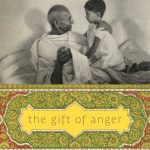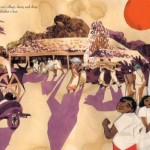My Son Grant’s Remorse by Anuradha Bhosale
Married women involving themselves in genuine social activism face a daily dilemma. Their family responsibilities and their extra – familial duties clash like cymbals, sometimes ear – splitting so. Living tends to become more a racket of conflicting interests rather than an ensemble of harmonizing sounds. At the extremes the contradiction may even have an unhinging effect. Here in such situations one is unwittingly goaded to stoic levels of patience and perseverance. Sometimes looking back to a past studded with such tribulations, you are yourself surprised to see how clashing relationships and considerations sorted themselves out, leading once again to an even flow of life. Perhaps an uncanny resilience is the essence of life, which keeps things moving in an even keel.
When the child is at the epicenter of social activism the undertaking becomes much more rigorous, delicate and demanding. Extension of maternal bent of mind is stretched to the limit. One’s capacity for unrelenting perseverance is tested to the hilt and those who emerge bruise-less from it succeed ultimately.
When my son, (Granth is his name but many call him ‘Kumar’), was hardly one and half years. My job of child education was entering a new and more intricate phase. AVANI had then decided to open informal residential school for deprived children of 6 and above age group. AVANI’s policy decision was based on my commitment and the potential they saw in me. And I owed to AVANI a steadfast stand on my part unmindful of consequences.
There was no one else to whom Kumar could be entrusted, a significant disadvantage faced by most divorcees. I had to take him along on my work routine. He has seen with me all the places in town where child labour is found, the shanties where they lived, the juvenile correction homes and so on. Outside of the hours spent in the kindergarten Kumar preferred to be at AVANI school because he knew he could get my company more at the school than at home, which was more a place for nightly halts, than a bosom for leisurely lolling in the tranquil warmth of loved ones. He has travelled with me to towns and cities where I went to participate in meetings and seminars. In fact as a small toddler he has accompanied me right up to Delhi, Hydrabad and Mumbai. One time my visits to a particular police station in Kolhapur were so frequent that he easily became thick with the inspector in-charge. So much so that the moment we entered the police station he ran to the officer and ensconced himself on his lap. His uniform fascinated him and he played endlessly with his brass epaulets. Recently when Kumar was asked what he would like to be, pat came the answer, “police fouzdaar!” (officer)
Nonetheless, all such diversions only meant for Kumar temporary substitutes to what he longed for intensely – my close companionship and my undivided attention. Sometimes he missed it too much, especially when he met his Mummie’s friends carrying their babies in arms. He would cry and protest vehemently to demand my time for himself. He registered his protests in a variety of ways. One which my friends even now do not let me forget happened at a public meeting when he was hardly four. When my time came I stood before the mike and began, “Bhai aur beheno!” He resented my standing alone forsaking him in the chair I was sitting in—. Throughout my talk he literally climbed on me clinging to my neck like a little monkey to its mother and slid down repeatedly as on a ‘wrestler’s pillar’ (better described as ‘Malla Khamb’ in Marathi, meant for athlete’s feats). Naturally, I had to cut short my talk midway to a loud and laughter – laced applause of the young audience.
Each child that came to be sheltered at AVANI carried the corns and scars of tragedy in one form or another. Pain and sorrow was a common part of their lives’ narrative. I have tried my best to tell Kumar about these sad stories and have tried to impress upon him the need they have for love and understanding, apart from bellyful food, clean clothes to wear and a feel of security. However, he remained unconvinced about why his Mummy should be shared by other unconnected children, whom he might have subconsciously loathed as his rivals.
An architect from USA, Scott Kafora, who has been with AVANI for the past two years working as a volunteer was returning from a fur low in Europe. We went to pick him up and came to know about the late arrival of his flight. To while away the time we – I and Kumar – went to see a movie at a cinema house near the airport. The picture being shown was ‘Stanleyka Dibba’ It depicted the story of a deprived child who rose from abject squalor to a life or respectability by dint of education and determination. Kumar was only seven years old at that time. But he understood the story that was so skillfully presented on the screen. The instant we emerged from the theatre Kumar hugged me tightly and started uncontrollably crying. I was puzzled. I couldn’t know what might have saddened him that much. Amidst sobs he could only mumble, “Sorry, Mummy!”
For good ten minutes he kept on crying in spasms and I was at a loss to know the reason. I too could not control my tears and we both wept together. When the spate of emotion subsided he could bring himself to say, “Today I understood the sorrow of the child labour. Forgive me for what harsh words I have spoken about them.” The deeply felt remorse shook him to the core. Out of the fire of scalding repentance a new Kumar is born. I am proud of him, and justly so! Ever since while with AVANI children Kumar has become a picture of kindness and camaraderie. He shares with them his brand new bicycle, his football and his cricket bat. And I never find him eating alone without the company of children.
Original Marathi : Anuradha
Translation : Arun Chavan
Anuradha Bhosale graduated from the Tata Institute for Social Work in Mumbai and worked as an apprentice to Arun Chavan at Verala Development Society. After understanding the needs of the area she branched out on her own creating a small organization called AVANI which is a Marathi language acronym for Clothes, Food and Home for the poor children.
Arun Chavan was a professor of English Literature at Kolhapur University when he saw the poverty and destitution that surrounded him. He decided to give up his job and devote his life to working for the poor. He founded the Verala Development Society and has been working for the past 40 years to bring about a socio-economic change in the area.







Speak Your Mind